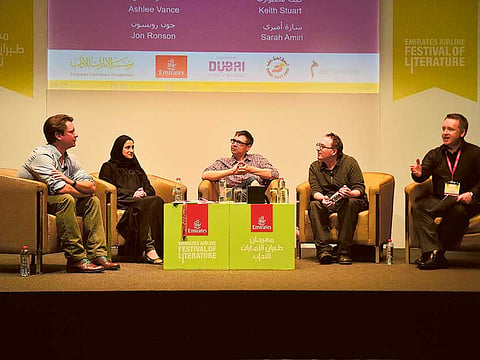‘Autonomy is inevitable’
Authors and scientists discuss how technology is changing how we live and work in a lively session at Emirates Literature Festival

Dubai: Technology is fast changing the way we move and how we live. With the social media already dominating the way we interact and smart solutions dictating how we work, authors and scientists explore the ways to adapt to the inevitable.
In a lively session at the Emirates Literature Festival that featured Sarah Amiri, Lead Scientist and Deputy Project Manager of Emirates Mars Mission; Ashlee Vance, biographer of Elon Musk, the billionaire founder of SpaceX and Tesla; Jon Ronson, the best-selling author of books like ‘Them’ and ‘So You Have Been Shamed’; and Keith Stuart, British gaming writer and debut novelist, the panel explored the ethics of social media and how technology is impacting modern life.
“There is no doubt the technology has changed the world. Social media started off as a utopia. It gave a voice to voiceless and marginalised people. So many socially awkward people who couldn’t express themselves eloquently started to use social media to air their views. We got a window into the peoples’ lives. It was like shame-free place in the early days, but things have changed over the years and trolls have taken over. I feel like social media has now helped aggressive authoritarianism take over,” said Ronson, whose latest book focuses on the impacts of social media.
Adding that self-righteous bullying and trolling have become norms of social media now, he called on all stakeholders to focus on the ethics of adopting modern technologies.
Though Sarah Amiri agreed to the need of ethics, she said the march of technology is inevitable.
“It is about humans being adaptable to the inevitable. Artificial intelligence is going to dominate our lives and people are developing it without thinking about its social impact, because you can’t possibly think about the countless social impacts any given technology can have,” she said.
Whether or not we are embracing the smart solutions, virtual reality is going to replace the way we live and work.
“Naturally, the next step for us to go is autonomous and I don’t think people would want to stop development at any point. With transport industry employing a third of jobs in the world, the autonomous technology might have an adverse impact on employment, but this is the way forward,” she said.
She added: “Jobs have been going out with the adoption of every new technology since the existence of humanity and its part of development, but technology has also helped create new jobs. The only concern is the rate at which the changes are happening — the jobs that are going out are faster than the lifetime of a person’s career. A person would eventually have to go through multiple careers that are completely different from one another.”
The panel agreed that the changes we are seeing are inevitable, the future success lies in how we adapt and how humans remain humans while transcending all these different changes.
Sign up for the Daily Briefing
Get the latest news and updates straight to your inbox
![Sharjah to pilot UNESCO’s ECCE-PATT tool, highlighting its leadership in early learning systems. [Illustrative image]](http://media.assettype.com/gulfnews%2F2026-02-08%2F3mxn16n8%2Fchild.jpg?w=320&auto=format%2Ccompress&fit=max)
